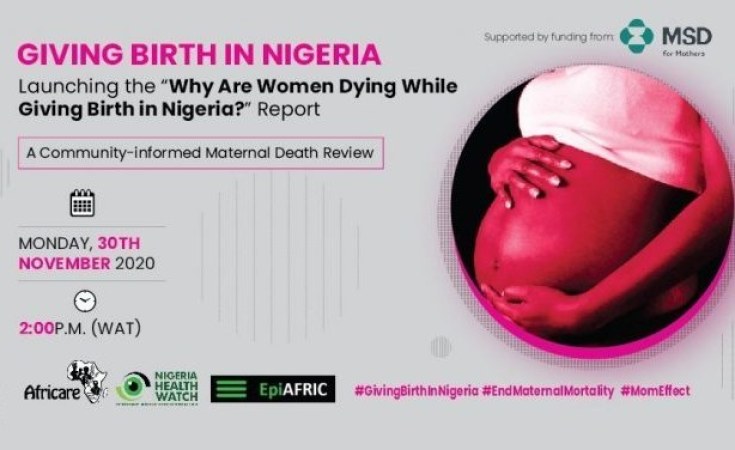BLOG
Africare,Nigeria Health Watch and EpiAFRIC are set to launch a report on the causes of maternal deaths in communities in Nigeria on Monday, 30 November 2020.

Despite advocacy efforts and interventions geared towards reducing preventable maternal deaths, the most vulnerable women in Nigeria are continuously faced with barriers when accessing quality health care. Nigeria is the second largest contributor to maternal mortality after India, with an estimated 58,000 maternal deaths annually.
The “Why Are Women Dying While Giving Birth in Nigeria?” report is the culmination of a community-informed maternal death review carried out in 18 communities across six states representing each geopolitical zone in Nigeria. The review takes a critical look at the reasons women are dying in Nigerian communities and it pulls together summary insights and findings from one year of community review into maternal deaths in communities in Nigeria.
The report outlines findings conducted during the Giving Birth in Nigeria programme, a programme led by a consortium consisting of Africare, Nigeria Health Watch and EpiAFRIC, and supported by funding from MSD for Mothers.
“The essence of the community-informed review is to better understand the reasons why women die while giving birth and to listen to the stories and experiences of the women in the communities,” said Vivianne Ihekweazu, Managing Director, Nigeria Health Watch.
For Dr. Ifeanyi Nsofor, CEO of EpiAFRIC, “The Giving Birth in Nigeria project was an opportunity to hear community voices on why women die during pregnancy, childbirth and 42 days after birth. This report amplifies community voices so that these preventable deaths would end.”
Health education at the community level helps to address the challenges of religious biases as well as knowledge gaps in safe motherhood and maternal health care practices. “Educating community members on their roles in preventing maternal death can contribute immensely to improving pregnancy outcomes,” said Dr. Patrick Adah, Officer in Charge, Africare Nigeria.
A virtual report launch will present an understanding of the state of maternal health care in communities in Nigeria. During the report launch, findings will be disseminated and insights and learnings from the report will be discussed with stakeholders and thought leaders in maternal health. Recommendations stemming from the report will be presented, exploring how the gaps in maternal health care in communities should be addressed.
Date: Monday, 30 November 2020
Time: 2:00 p.m (WAT)
Register to attend here
About Africare
Africare is a leading non-governmental organization (NGO) committed to addressing African development and policy issues by working in partnership with African people to build sustainable, healthy and productive communities. Learn more at www.africare.org/country/nigeria
About Nigeria Health Watch
Nigeria Health Watch uses informed advocacy and communication to influence health policy and seek better health and access to healthcare in Nigeria. We seek to amplify some of the great work happening in the health sector, challenge the bad, and create a space for positive ideas and action. Through its various platforms, Nigeria Health Watch is a trusted source that provides informed commentary and in-depth analysis of health issues in Nigeria, always in good conscience. Learn more at www.nigeriahealthwatch.com
About EpiAFRIC
EpiAFRIC is a globally competitive, efficient, transparent and financially sustainable African health consultancy group. EpiAFRIC’s consulting work focuses on improving population health through expert research and data analysis, project design and evaluation, health communication, advocacy and training. Learn more at www.epiafric.com
About MSD for Mothers
MSD for Mothers is MSD’s $500 million global initiative to help create a world where no woman has to die while giving life. MSD for Mothers is an initiative of Merck & Co., Inc., Kenilworth, NJ, U.S.A. Learn more at www.msdformothers.com
Contact:
Contact Person: Atinuke Akande-Alegbe
Phone number: 0703 888 2265
Twitter: @nighealthwatch
Facebook: @nigeriahealthwatch
Email: atinuke@nigeriahealthwatch.com
Read the original article on Nigeria Health Watch.